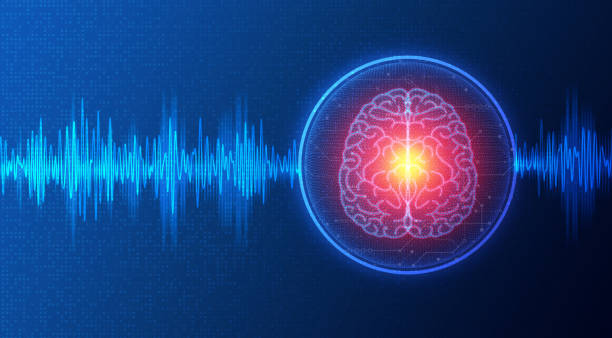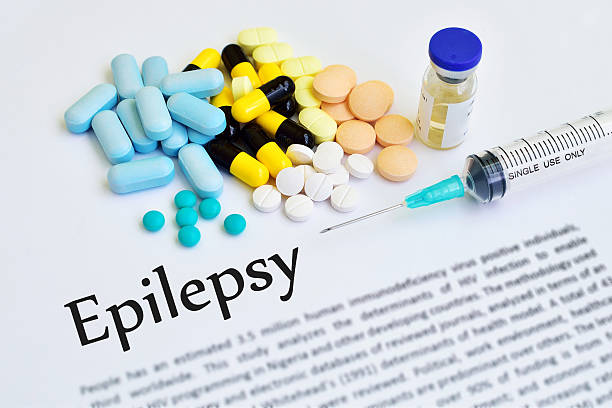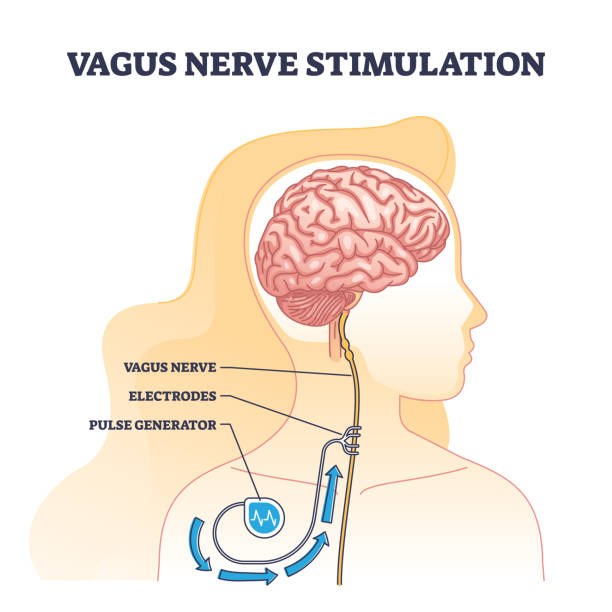Vagus Nerve Stimulation in Mumbai

Vagus nerve stimulation (VNS) has become a promising option for people whose epilepsy or depression has not improved with standard treatments.
Dr. Siddharth Kharkar, one of the best neurologists in Mumbai, brings extensive international experience to the field of neurology and is among the few specialists offering advanced vagus nerve stimulation in Mumbai.
He believes, “When medications alone no longer give the desired response, vagus nerve stimulation opens a new pathway.” With his deep expertise in epilepsy and movement disorders, Dr. Kharkar helps patients regain control and quality of life through safe, precise, and effective use of VNS therapy.

What Is Vagus Nerve Stimulation?

The vagus nerve is one of the main communication pathways between the brain and body. It helps control vital functions such as heart rate, breathing, and mood regulation.
Vagus nerve stimulation (VNS) is a neuromodulation treatment that uses mild electrical impulses to stimulate this nerve. A small device, similar to a pacemaker, is implanted under the skin of the chest. A thin wire connects the device to the vagus nerve in the neck. Once activated, it sends gentle signals to the brain at regular intervals.
These signals help reduce abnormal electrical activity in the brain, improving seizure control in epilepsy and stabilizing mood in depression. The procedure does not involve surgery on the brain, making it a safe and minimally invasive therapy.
Here’s where it stands apart.
How VNS Differs from Other Treatments

Most epilepsy or depression treatments rely on medications that work throughout the body. These medicines often need adjustments and can sometimes cause side effects.
Vagus nerve stimulation works differently. Instead of using drugs, it gently modifies brain activity through electrical impulses. This helps the brain regulate itself better over time.
Compared to brain surgery, VNS is less invasive and reversible. The device can be adjusted, switched off, or removed if necessary. For many people who have tried multiple medicines without full relief, VNS offers a new direction—targeted, controlled, and long-lasting.

Struggling with epilepsy that doesn’t respond to drugs? Schedule a consultation to know how VNS therapy can reduce seizure frequency and improve daily life
Meet the expert who excels in this advanced therapy.
About Dr. Siddharth Kharkar
Dr. Siddharth Kharkar is an experienced neurologist in Mumbai and Thane, with advanced training from world-renowned institutions in India, the USA, and the UK. He is American Board Certified in Neurology and has served as faculty at the University of Alabama in Birmingham, USA.
He completed his Fellowship in Epilepsy at the University of California, San Francisco (UCSF) and advanced training in Movement Disorders and Parkinson’s Disease at King’s College, London.
Recognized by India Today and Outlook India magazines as one of the best neurologists in Mumbai, Dr. Kharkar combines international expertise with a deep commitment to patient-centered care. His experience ensures that complex therapies like vagus nerve stimulation are delivered with precision, safety, and a personalized approach that focuses on each patient’s individual needs.

Wondering if VNS could help you?
Who Is a Good Candidate for Vagus Nerve Stimulation?

People with epilepsy who continue to have seizures despite trying two or more anti-seizure medications.
Individuals with treatment-resistant depression that has not improved after several antidepressants or psychotherapy.
Patients who are not suitable candidates for brain surgery or prefer a less invasive approach.
Before recommending VNS, Dr. Kharkar conducts a thorough evaluation to determine whether VNS is a safe and effective option for each patient.
Here’s why many patients consider it
Benefits of Vagus Nerve Stimulation
Better seizure control:
Many people experience a significant reduction in seizure frequency and intensity.
Improved mood and energy:
In depression, VNS can help balance brain chemistry and improve daily functioning.
Gradual and lasting effect:
Unlike medication that acts immediately, VNS improves symptoms steadily over time.
Reduced medication dependency:
Some patients can lower their medication dosage under medical supervision.
Minimally invasive:
The implant procedure is short, safe, and does not involve brain surgery.
The improvement with VNS builds over months, leading to a more stable and manageable condition for long-term relief.
Check out how the procedure is carried out.
Procedure of VNS
The VNS procedure is performed under general anesthesia and usually takes about one to two hours. Before the surgery, Dr. Siddharth Kharkar, a leading neurologist in Thane and Mumbai, conducts a thorough pre-operative assessment. This includes reviewing the patient’s medical history, relevant imaging, and ensuring medical fitness for the procedure.
Here’s how it’s done:

Device Placement:
A small incision is made in the upper chest to place the device.
Lead Connection:
A thin wire is tunneled under the skin and attached to the vagus nerve in the neck.
Testing:
The device is tested before closing the incision to ensure proper function.
Activation:
After a healing period, the device is switched on and programmed to deliver mild, periodic electrical impulses.
Counseling and Supportive Care
We support intellectually and emotionally caregivers and patients and treat the mental health aspects of Parkinson's.
Patients usually go home the same or next day. The settings are fine-tuned in follow-up visits based on response and comfort.

Here’s what happens after the implant.
Follow-Up Care After Vagus Nerve Stimulation
Follow-up is a crucial part of VNS therapy. The device is programmed gradually to reach the most effective settings. Regular check-ups allow the neurologist to monitor progress and adjust the stimulation as needed. Patients are also taught how to use a small hand-held magnet to temporarily stop or trigger stimulation when required. Long-term follow-up includes periodic device checks and review of seizure or mood improvements. Dr. Kharkar’s structured follow-up care ensures that every aspect of therapy—from implantation to optimization—is handled with precision and attention.
Read on to know why patients trust Dr. Kharkar
Why Choose Dr. Siddharth Kharkar for Vagus Nerve Stimulation in Mumbai
Global Expertise:
Brings international experience from top institutions in the USA and UK, ensuring world-class standards in every procedure.
Extensive Experience:
Expertise in epilepsy, Parkinson’s, and neuromodulation makes him one of the few neurologists in India qualified to perform vagus nerve stimulation.
Personalized Care:
Every patient is assessed individually, ensuring the therapy fits their unique needs.
Advanced Technology:
Use of modern VNS devices and precise programming for optimal outcomes.
Comprehensive Guidance:
From evaluation to post-implant follow-up, every step is managed with clarity and professionalism.
Let’s discuss the charges of this treatment.
Cost of Vagus Nerve Stimulation in Mumbai
The vagus nerve stimulation cost in India varies depending on several key factors, each contributing to the total treatment expense. They include:
- Type of VNS device used
- Hospital and surgical facilities
- Professional expertise
- Duration of hospital stay
- Follow-up and programming sessions
During consultation, Dr. Kharkar provides a clear cost estimate and explains each component, ensuring patients can make informed and confident decisions before beginning therapy.
Have questions about the procedure or cost? Speak with a specialist to understand every aspect of the therapy before deciding
Here’s what’s new in the field.
Latest Advances in VNS Therapy
Recent innovations in VNS have made therapy safer and more efficient. Modern devices are smaller, programmable, and come with longer battery life. Some allow wireless adjustments, improving patient comfort.
Research is also exploring new applications for VNS in areas such as stroke recovery and anxiety disorders. These advances show the expanding potential of neuromodulation in improving brain function and quality of life.
Frequently Asked Questions
Can VNS cure epilepsy or depression completely?
VNS does not cure these conditions but can greatly reduce symptoms and improve control, leading to better daily living.
Are there any risks involved in VNS therapy?
Minor side effects like voice changes or mild throat discomfort are possible but usually temporary. Serious risks are rare.
When will I start seeing results after VNS?
Improvement may take a few months as the brain gradually adjusts to the stimulation.
Is VNS therapy covered by insurance?
Coverage depends on the insurance provider and plan. It’s best to confirm the details before proceeding with the procedure.
